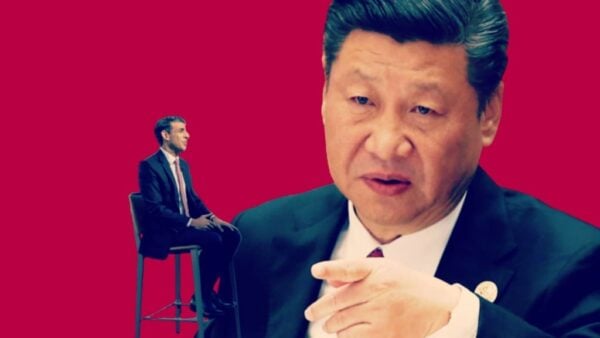British PM Rishi Sunak Protests ‘Interference’ by the Chinese, After Parliamentary Staffer is Arrested For Alleged Spying For the CCP

During the last day of the G20 Summit in New Delhi, India, Prime Minister Rishi Sunak had a tense, unscheduled meeting with the Chinese delegation led by Foreign Minister Li Qiang, during which he stated that he ‘raised his concern over any Chinese interference in Britain’s parliamentary democracy’
The move comes as the UK political world is shaken, after it emerged that a parliamentary researcher with links to senior Conservatives and potential access to sensitive information had been arrested over allegations of spying for China.
Sunak: “I obviously can’t comment on the specifics of an ongoing investigation but with regard to my meeting with Premier Li, what I said very specifically is that I raised a range of different concerns that we have in areas of disagreement, and in particular, my very strong concerns about any interference in our parliamentary democracy, which is obviously unacceptable.”
Reuters reported:
“The allegations potentially undermine Sunak’s bid for more dialogue with China, illustrated by a visit by foreign minister James Cleverly to Beijing last week.”
Sunak’s administration has sought closer relations with China, engaging with Beijing on matters such as climate change – but at the same time also criticizing it in areas such as human rights.
“Sunak said he raised areas where there are disagreements, but the meeting showed the value of the strategy of engaging ‘where it makes sense’.
‘I think the right thing to do was take the opportunity to engage, to raise concerns specifically, rather than just shouting from the sidelines’, he said.”
Australia and Canada have also been dealing recently with the issue of Chinese espionage or ‘interference in politics’, always with the Chinese government denying any such activity.
BBC reported:
“The arrests will reignite the debate over London’s relationship with Beijing. There has been growing concern about Chinese espionage and also interference in Parliament, with questions about whether more action should have been taken to mitigate risks.”
“Tensions have been increasing over both espionage and wider security threats in recent years – but the last few months has seen attempts by both Washington and London to stabilize relations with China.”
In July, the UK’s Parliament’s Intelligence and Security Committee issued a report warning that ‘the government had been slow to come to terms with the security risks from Beijing’.
“‘It appears that China has a high level of intent to interfere with the UK government, targeting officials and bodies at a range of levels to influence UK political thinking and decision-making relevant to China’, the report said.
It noted the challenges in prosecuting cases linked to espionage given that it was, at that time, not a criminal offence to be an agent of a foreign intelligence service.”
The Uk has since enacted National security legislation to provide new powers to investigate espionage and other security threats.
But this only came into effect this summer, and the recently leaked arrest of the two men still took place under the old ‘Official Secrets Act’.
The Guardian reported:
“Iain Duncan Smith, the former Conservative leader who has repeatedly urged a more sceptical approach towards Beijing, told Times Radio: ‘I think we are deeply penetrated by the Chinese because of our ambivalent attitude towards them. People like me get criticized because we make too much of this and then you see this happening.
If you can penetrate parliament like this over such a long period of time, then how many other institutions with less [tight] levels of security are being penetrated on a daily basis?’”
